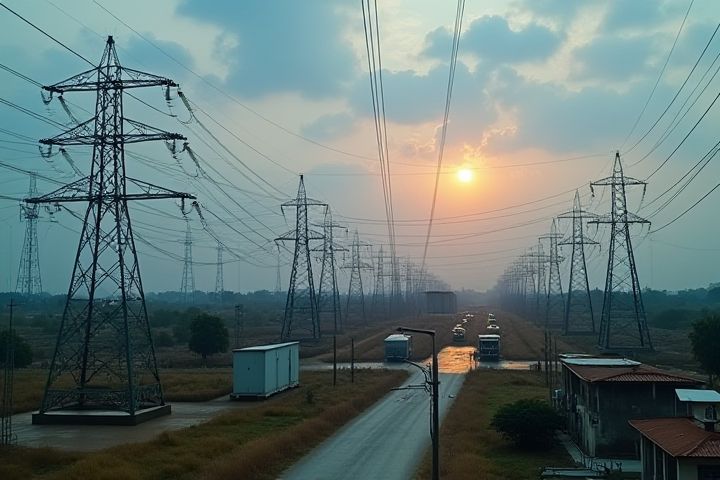
Nigeria's power generation capacity primarily relies on thermal and hydroelectric power plants, with natural gas being the dominant fuel source. The national grid struggles with reliability, leading to frequent blackouts and reliance on alternative electricity sources, such as diesel generators. Renewable energy sources, such as solar and wind, are gaining traction as the government encourages diversification through initiatives aimed at boosting clean energy investments. Despite having significant natural resources, challenges including outdated infrastructure, regulatory issues, and insufficient maintenance hinder efficient power distribution. For your energy needs, understanding the landscape of power generation in Nigeria is essential for exploring sustainable solutions.
Predominantly reliant on gas-fired power plants
Power generation in Nigeria relies predominantly on gas-fired power plants, which constitute a significant portion of the nation's energy infrastructure. These plants leverage the abundant natural gas resources available in the country, making them a cost-effective option for electricity generation. Due to this reliance on gas, factors such as fluctuations in global gas prices and domestic gas supply can heavily influence the stability and affordability of electricity. As the nation seeks to diversify its energy sources, investment in renewable energy technologies may play a critical role in shaping Nigeria's future power landscape.
Limited infrastructure and outdated equipment
In Nigeria, power generation is hampered by limited infrastructure and outdated equipment, which significantly affects the overall efficiency and reliability of energy supply. The aging power plants and inadequate transmission networks contribute to frequent outages and increased reliance on alternative power sources such as generators. As a result, businesses and households face higher operational costs and reduced productivity due to the inconsistent electricity supply. The need for modernization and investment in renewable energy solutions has become crucial to meet the growing demand for electricity and improve the country's economic prospects.
Frequent power outages and load shedding
Power generation in Nigeria faces significant challenges due to frequent power outages and load shedding, impacting businesses and daily life. The country's energy infrastructure struggles to meet the growing demand, with an estimated generation capacity well below its potential needs. Investments in renewable energy sources, such as solar and wind, are being explored to diversify the energy mix and enhance reliability. Addressing these issues is crucial for economic growth and improving the quality of life for Nigerian citizens.
Significant untapped renewable energy potential
Nigeria possesses a vast array of untapped renewable energy resources, including solar, wind, hydro, and biomass. With abundant sunshine for most of the year, solar energy stands out as a viable option for electrifying remote areas. Wind energy potential, particularly in the northern region, remains largely unexplored and could provide significant contributions to the energy mix. Investing in these renewable sources not only fosters energy independence but also promotes sustainable development, reducing reliance on fossil fuels and enhancing environmental resilience.
Low electrification rate in rural areas
Power generation in Nigeria faces significant challenges, particularly in rural areas where the electrification rate is critically low. Approximately 90 million Nigerians lack access to reliable electricity, hampering economic development and quality of life. Initiatives aimed at expanding renewable energy sources, such as solar and wind, are being implemented to address these disparities and improve accessibility. By investing in decentralized energy solutions, you can help foster sustainable growth and elevate living standards within these underserved communities.
Ongoing efforts for privatization and reform
Power generation in Nigeria is undergoing significant privatization and reform initiatives aimed at enhancing efficiency and reliability. The government has implemented policies to attract private investments in the energy sector, resulting in the emergence of independent power producers (IPPs). Challenges such as inadequate infrastructure and inconsistent regulatory frameworks still persist, but efforts are being made to improve the overall electricity supply and distribution network. You can expect that these transformative measures will promote sustainable energy development and boost economic growth in Nigeria.
High transmission and distribution losses
Nigeria's power generation sector grapples with significant challenges, particularly high transmission and distribution losses estimated at nearly 40%. Inadequate infrastructure, frequent equipment malfunctions, and outdated technology contribute to the inefficiencies observed in the power grid. These losses severely impact the overall electricity supply, hindering economic growth and access to reliable energy for businesses and households alike. Addressing these issues through infrastructural investments and innovative technologies is vital for optimizing the country's energy output and ensuring sustainable development.
Reliance on diesel generators for backup power
Nigeria's power generation heavily relies on diesel generators, primarily used as backup power solutions due to the inconsistent electricity supply from the national grid. Diesel generators provide a crucial alternative for businesses and households, ensuring operational continuity during power outages. Despite rising fuel costs and environmental concerns associated with diesel emissions, many Nigerian sectors find this option indispensable. Investing in renewable energy sources and improving grid infrastructure could significantly reduce this reliance, enhancing overall energy security and sustainability.
World Bank and other international aid involvement
Power generation in Nigeria is heavily influenced by World Bank initiatives and international aid programs, which aim to improve the nation's electricity infrastructure. These partnerships have led to substantial investments in renewable energy projects, enhancing access to electricity for millions of Nigerians. The emphasis on sustainable power solutions not only targets energy security but also fosters economic growth and job creation. As a result, your engagement with these developments can lead to a better understanding of Nigeria's evolving energy landscape.
Growing interest in solar power and mini-grids
In Nigeria, the energy sector is experiencing a significant shift towards solar power and mini-grids, driven by the country's abundant sunlight and the need for sustainable energy solutions. Solar power offers a decentralized approach to electricity generation, allowing communities to harness renewable energy and reduce reliance on traditional grid systems. Mini-grids, which combine solar energy with battery storage, enhance energy access in remote areas, providing reliable power for homes and businesses. As investment in solar technology increases, Nigeria aims to improve energy security, lower carbon emissions, and stimulate economic growth through innovative power solutions.
